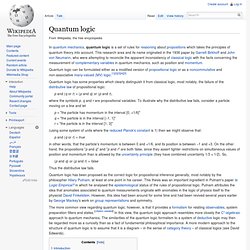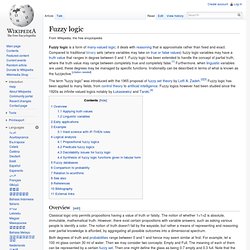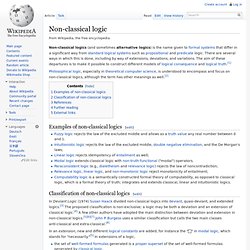

Quantum logic. Quantum logic can be formulated either as a modified version of propositional logic or as a noncommutative and non-associative many-valued (MV) logic.[1][2][3][4][5] Quantum logic has some properties which clearly distinguish it from classical logic, most notably, the failure of the distributive law of propositional logic: p and (q or r) = (p and q) or (p and r), where the symbols p, q and r are propositional variables.

To illustrate why the distributive law fails, consider a particle moving on a line and let p = "the particle has momentum in the interval [0, +1/6]" q = "the particle is in the interval [−1, 1]" r = "the particle is in the interval [1, 3]" (using some system of units where the reduced Planck's constant is 1) then we might observe that: p and (q or r) = true in other words, that the particle's momentum is between 0 and +1/6, and its position is between −1 and +3. (p and q) or (p and r) = false Thus the distributive law fails. Introduction[edit] Projections as propositions[edit] Quantum logic. Fuzzy logic. Fuzzy logic is a form of many-valued logic; it deals with reasoning that is approximate rather than fixed and exact.

Compared to traditional binary sets (where variables may take on true or false values) fuzzy logic variables may have a truth value that ranges in degree between 0 and 1. Fuzzy logic has been extended to handle the concept of partial truth, where the truth value may range between completely true and completely false.[1] Furthermore, when linguistic variables are used, these degrees may be managed by specific functions. Irrationality can be described in terms of what is known as the fuzzjective. [citation needed] The term "fuzzy logic" was introduced with the 1965 proposal of fuzzy set theory by Lotfi A. Non-classical logic. Non-classical logics (and sometimes alternative logics) is the name given to formal systems that differ in a significant way from standard logical systems such as propositional and predicate logic.

There are several ways in which this is done, including by way of extensions, deviations, and variations. The aim of these departures is to make it possible to construct different models of logical consequence and logical truth.[1] Philosophical logic, especially in theoretical computer science, is understood to encompass and focus on non-classical logics, although the term has other meanings as well.[2] Examples of non-classical logics[edit] Classification of non-classical logics[edit] In an extension, new and different logical constants are added, for instance the " " in modal logic, which stands for "necessarily (See also Conservative extension.)
In a deviation, the usual logical constants are used, but are given a different meaning than usual. References[edit] Further reading[edit]